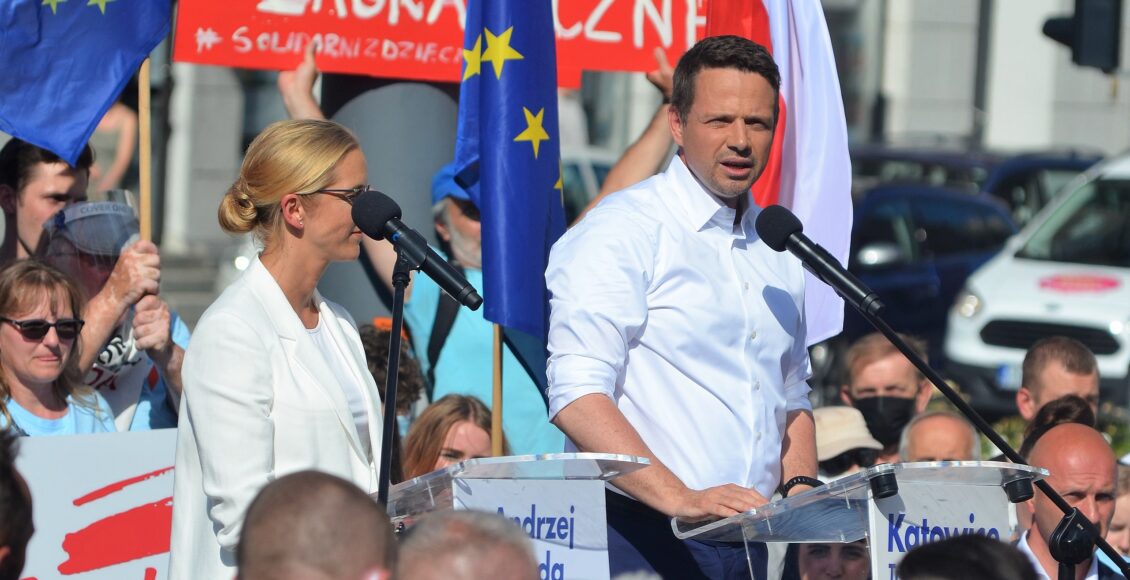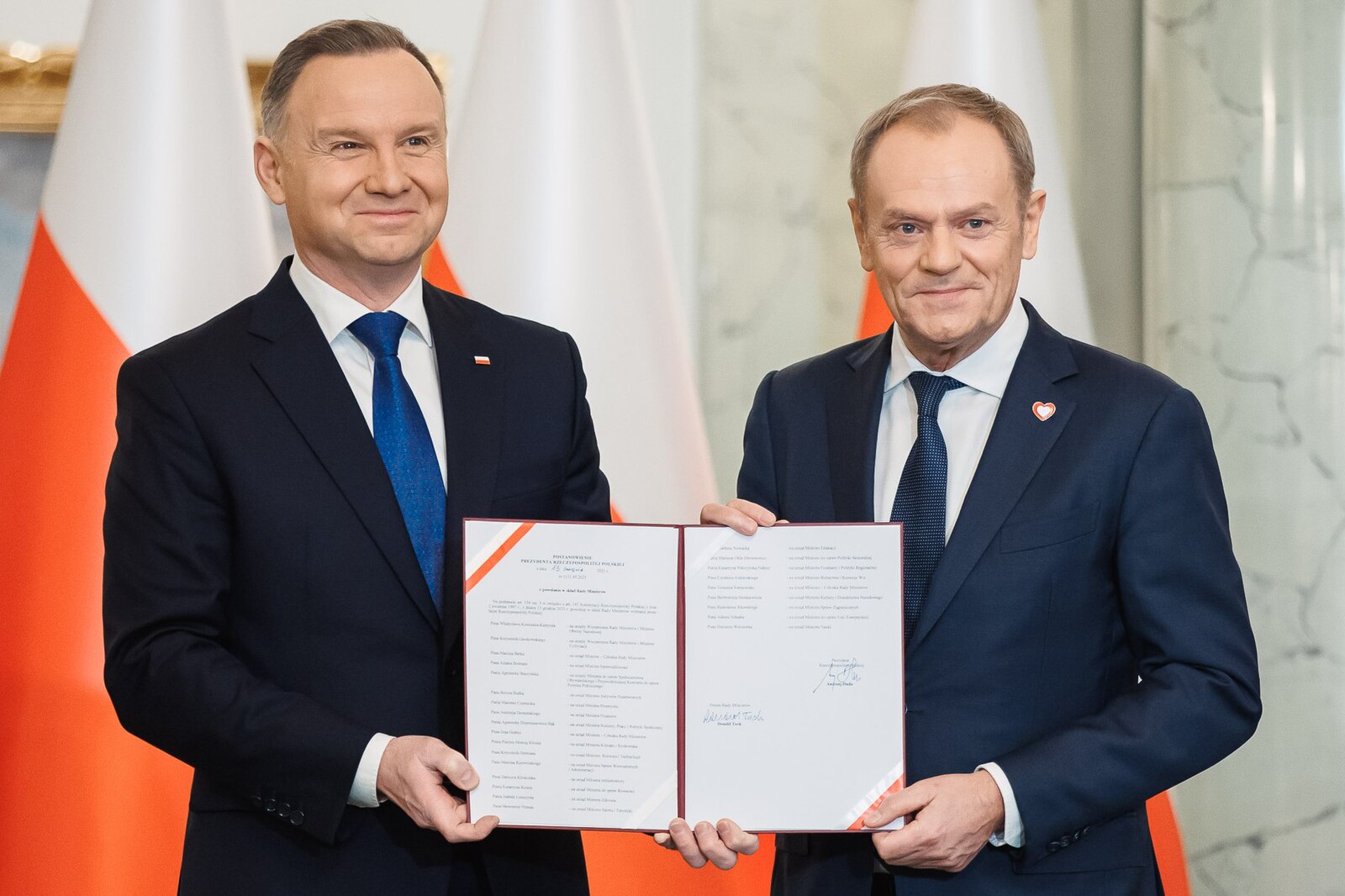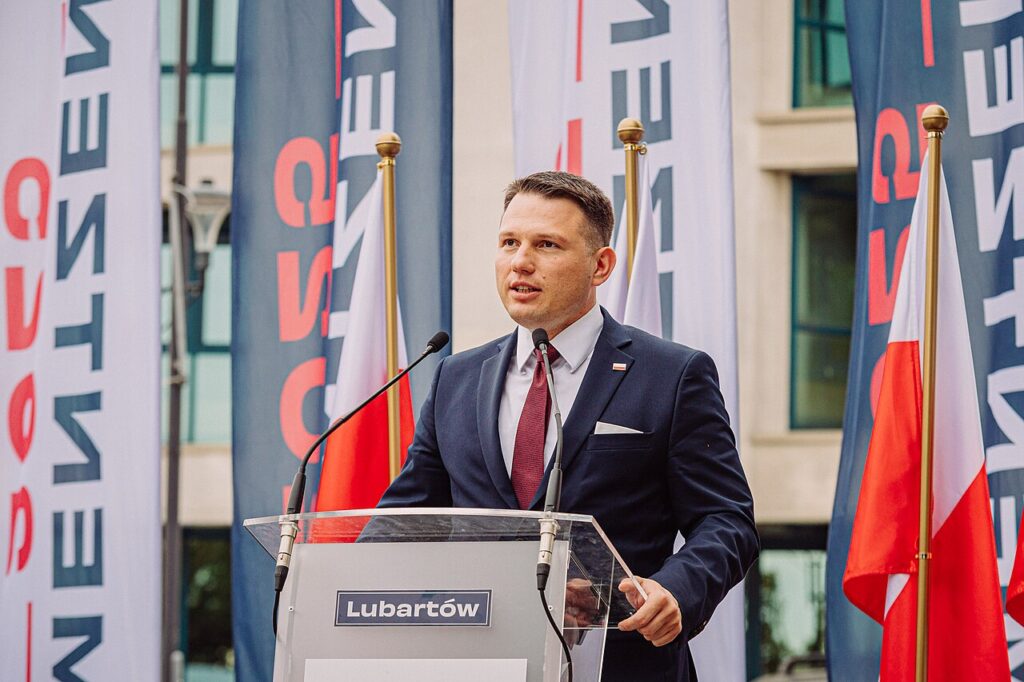The Mayor, the Nationalist, and the TikToker: Poland’s Presidential Election

Europe is closely watching Poland’s upcoming presidential election, which will decide whether Prime Minister Donald Tusk’s coalition can act on its centrist agenda. On May 18, Poles will cast their votes in the first round of the presidential election. If no candidate achieves a majority, a run-off will be held on June 1. The mayor of Warsaw, Rafal Trzaskowski, backed by the centrist Civic Platform Party (PO), will face Karol Nawrocki of the right-wing Law and Justice Party (PiS) and Slawomir Mentzen, the rising star of the far-right Confederation Party (KWiN).
Since December 2023, the centrist parliamentary coalition, led by Tusk and his Civic Platform Party, has been restrained by President Andrzej Duda of PiS. Tusk, the Prime Minister of Poland between 2007 and 2014 and the President of the European Council between 2014 and 2019, returned to Polish politics in 2021 on a mandate to liberalize the country after eight years of illiberal right-wing rule. PiS, which governed from 2015 to 2023, steadily weakened Poland’s judiciary, press, and state institutions while distancing the country from the European Union. The PiS government received international attention for criminalizing abortion, advancing strong anti-immigrant rhetoric, and cracking down on LGBTQ+ rights.
The Polish Constitution grants the Presidency, which is primarily a symbolic role, significant veto power. Duda has often used that power to block legislation aimed at easing abortion restrictions, veto national budget plans, and reject nominations for ambassadors to the US, Ukraine, and NATO.

Currently, Trzaskowski leads in the polls but faces a complicated path toward a majority. The popular mayor of Warsaw, who holds a PhD in EU Studies, is polling around 35 per cent in the first round. With Trzaskowski as president, the Civic Platform Party would remove the veto threat, which normally takes three-fifths of the parliament to override. In the second round, Trzaskowski will likely face PiS’s Nawrocki. The former director of Poland’s World War II Museum, Nawrocki, has led the museum to international praise for its research and has also faced criticism for shifting the institute’s narrative towards nationalism. Following Russia’s invasion of Ukraine in 2022, Nawrocki led efforts to remove Soviet Communist-era monuments in Poland, which, at the time, was a popular move. Nawrocki has already vowed to follow in Duda’s veto-heavy footsteps.
Beyond the presidency itself, the most disruptive force in this election may be Mentzen and his Confederation Party. Just a few years ago, Confederation hovered near the 5 per cent in polls, a fringe coalition of libertarian and ultra-nationalist groups that campaigned together for EU parliamentary elections. In 2019, Mentzen gained notoriety for declaring that his movement opposed “Jews, homosexuals, abortion, taxes, and the European Union”—a statement that earned both condemnation and a lasting nickname: the “Confederation Five.”
But in the digital age, politics is as much about rebranding as ideology. Now 36, Mentzen has softened his rhetoric and reinvented himself as a voice for disillusioned youth. His TikTok following, over 700,000, is unmatched among Polish politicians. His videos, often slick and humorous, rack up tens of millions of views. In particular, young men are drawn to his anti-tax libertarianism, political incorrectness, sharp critiques of bureaucracy, and outsider appeal. Mentzen’s anti-Ukraine rhetoric resonates with Polish farmers and youth who feel the country has provided too much support to its eastern neighbour. Polish attitudes towards Ukrainian refugees, who now number nearly a million, have soured. 30 per cent of Poles now have a negative opinion of Ukrainian refugees. Mentzen is unlikely to win, but the Confederation is now a dark horse in the race, potentially unseating PiS as the dominant right-wing party and potential opposition party.

The most likely second-round run-off would occur between Trzaskowski and Nawrocki. Trzaskowski is favoured and would likely gain votes from centrist Szymon Holownia and left-wing Magdalena Biejat, who poll at 7 per cent and 4 per cent respectively. Nawrocki could count on some support from Mentzen, at 18 per cent, although many of Mentzen’s supporters view PiS as part of the same political establishment they seek to dismantle.
International observers are watching Poland’s presidential election not only for its domestic implications but also for what it signals about European unity. Under PiS, Warsaw was a frequent thorn in Brussels’ side, challenging the rule of law, demanding reparations from Germany, and clashing over LGBTQ+ rights. Since the 2023 election, Tusk’s government has realigned the country with the EU, regaining access to €137 billion in frozen funds. However, to avoid damaging Trzaskowski’s electoral prospects, the Tusk government has also diverged with the EU on illegal migration from Belarus. A Trzaskowski victory would solidify pro-EU policy in Warsaw. For Europe, Poland’s election is another test of the popularity of the far-right. In Germany, for example, whose Alternative for Germany (AfD) party soared to 20.8 per cent in recent elections, observers will look at the Confederation to gauge how influential populist parties have become in other Central European states.
Poland’s presidential election will shape the pace of reform, relations with the EU, and the appeal of rising populist politics. Record turnout in the 2023 parliamentary elections—higher than the first free elections in 1989—revealed a renewed urgency among Poles to shape their country’s future. With a likely second round on June 1, voters will decide whether to consolidate liberal governance, preserve conservative veto power, or open the door to the far right. Whichever path they choose, the consequences will reverberate across Europe.
Edited by Grace Hodges
Featured Image: Rafał Trzaskowski, speaking at a rally in Katowice, 2020. Photo by Silar. Licensed under CC BY-SA 4.0
